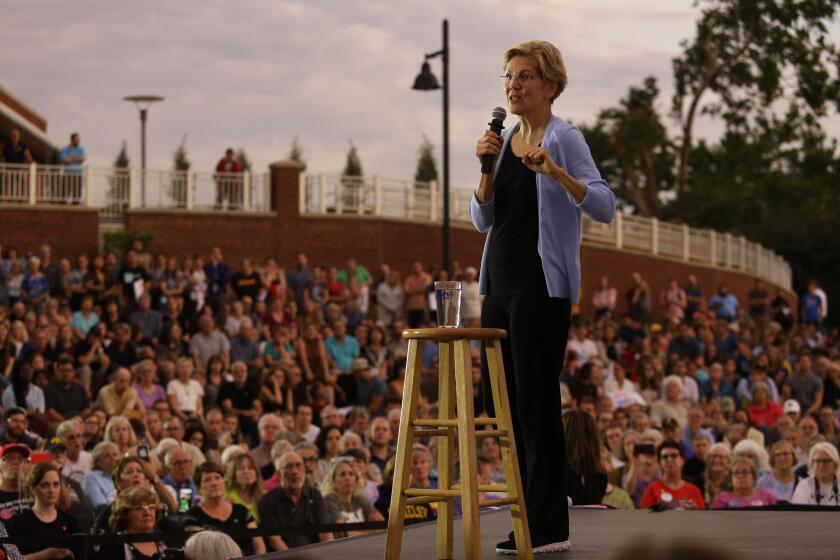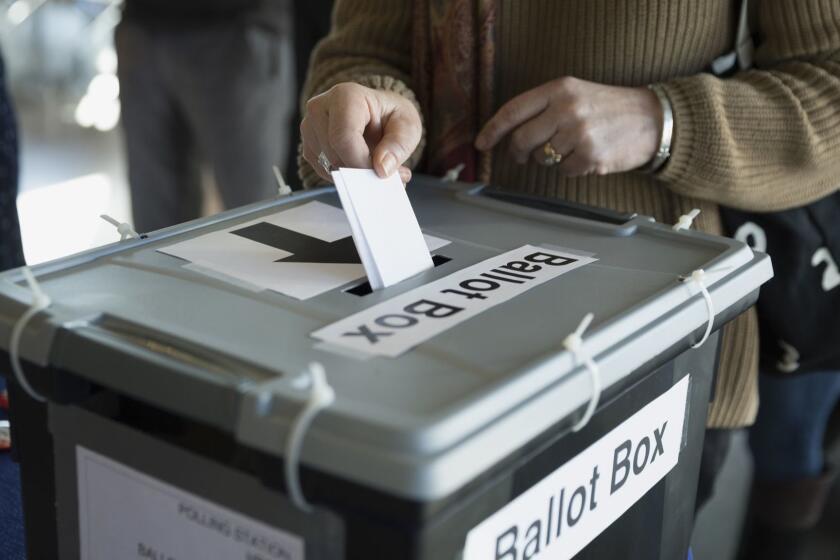Warren takes Democratic presidential nomination lead in California, new poll finds
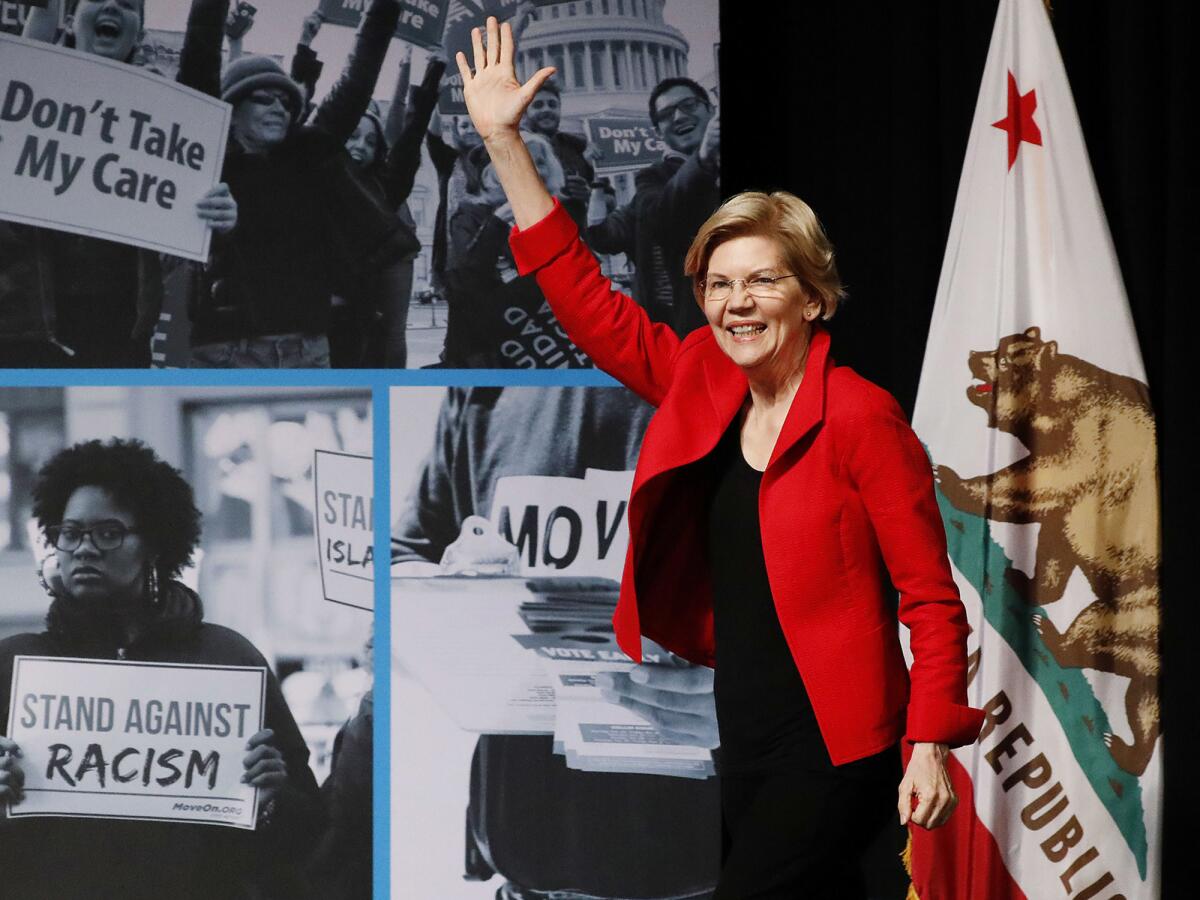
- Share via
WASHINGTON — Sen. Elizabeth Warren has jumped to a significant lead in the Democratic presidential race in California, solidifying her position as a front-runner for the party’s nomination, according to the latest UC Berkeley Institute of Governmental Studies poll, conducted for the Los Angeles Times.
The contest in California has shifted in important ways since June, when the Berkeley IGS poll last surveyed the state’s voters for The Times. At that point, the race here had no clear front-runner. Although Warren was among the top candidates, her support was heavily concentrated among college-educated white voters and those who described themselves as “very liberal.”
The new poll shows Warren has widened her base of support and begun to separate herself from her rivals. She’s the first choice of 29% of likely Democratic primary voters, up from 18% in June, the poll finds.
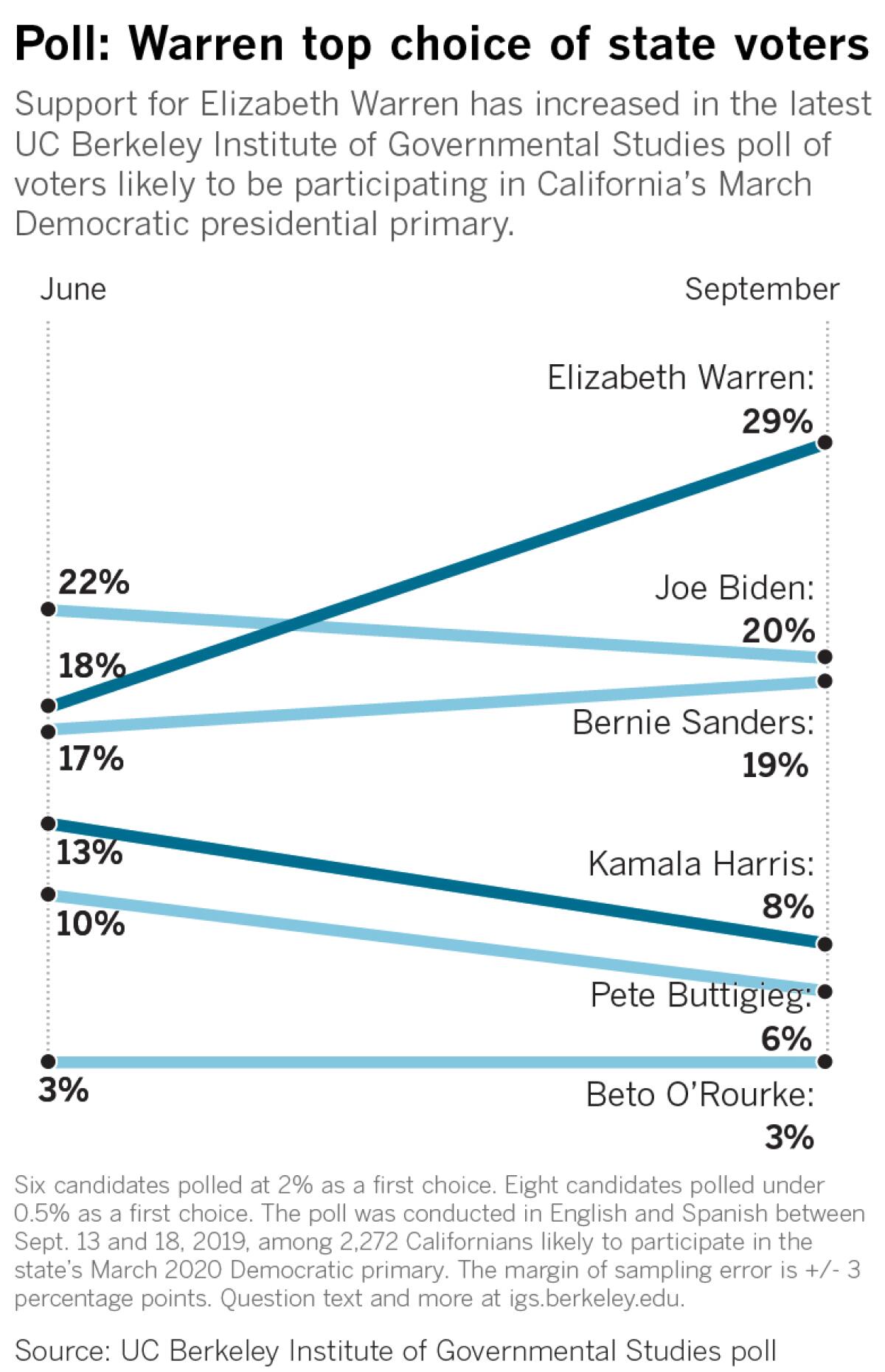
“We appear to be at an inflection point in the Democratic presidential campaign,” said Mark DiCamillo, the director of the Berkeley IGS poll. “The changing voting preferences of California Democrats may be a harbinger of things to come elsewhere across the country.”
As Warren has risen, her two closest rivals, former Vice President Joe Biden and Sen. Bernie Sanders of Vermont, have remained stuck in place. The poll finds the two essentially tied for second, with Biden at 20% and Sanders at 19%, both only slightly different from their positions in June. California Sen. Kamala Harris has slipped to a distant fourth, at 8%.
A lead for Warren in California matters in part because the state will have by far the largest number of delegates at next summer’s Democratic nominating convention — 497, of whom 416 will be allocated through the March 3 primary to candidates who win at least 15% of the vote either statewide or in specific congressional districts — but also because California’s Democratic voters reflect the ethnic and racial diversity of the party nationwide.
Other recent surveys have shown Warren gaining ground nationally and in states that hold the earliest contests in the nominating process. A Des Moines Register poll on Saturday showed her leading in Iowa, and a poll from Monmouth College on Tuesday showed Warren and Biden essentially tied in New Hampshire. A national poll released Wednesday by Quinnipiac University found Warren and Biden essentially tied.
In Iowa, Sen. Elizabeth Warren has moved into the lead. She’s grown her support with attention to detail and an ability to connect with voters.
The new California poll, however, is the first public survey to show Warren leading in the type of large, diverse state she would need to win in order to capture the nomination.
The reverse is also true — failure to do well in California would present a formidable barrier for some other candidates. Sanders, for example, took 46% of the vote in the California primary in 2016, and his advisors have seen the state as a key part of their road to the nomination, a path that now seems significantly steeper.
The path would be even harder for the state’s junior senator. Harris has slogged through a difficult period in her campaign nationally and has suffered at home, as well. Her 8% support in the poll is down from 13% in June. Although she remains close to her rivals in the Bay Area, which is her political base, Harris trails badly in Southern California and the Central Valley.
Statewide, Harris stands just slightly ahead of Pete Buttigieg, the mayor of South Bend, Ind., who receives 6%. No other candidates receive more than 3% support, and 8% of likely voters say they have no preference.
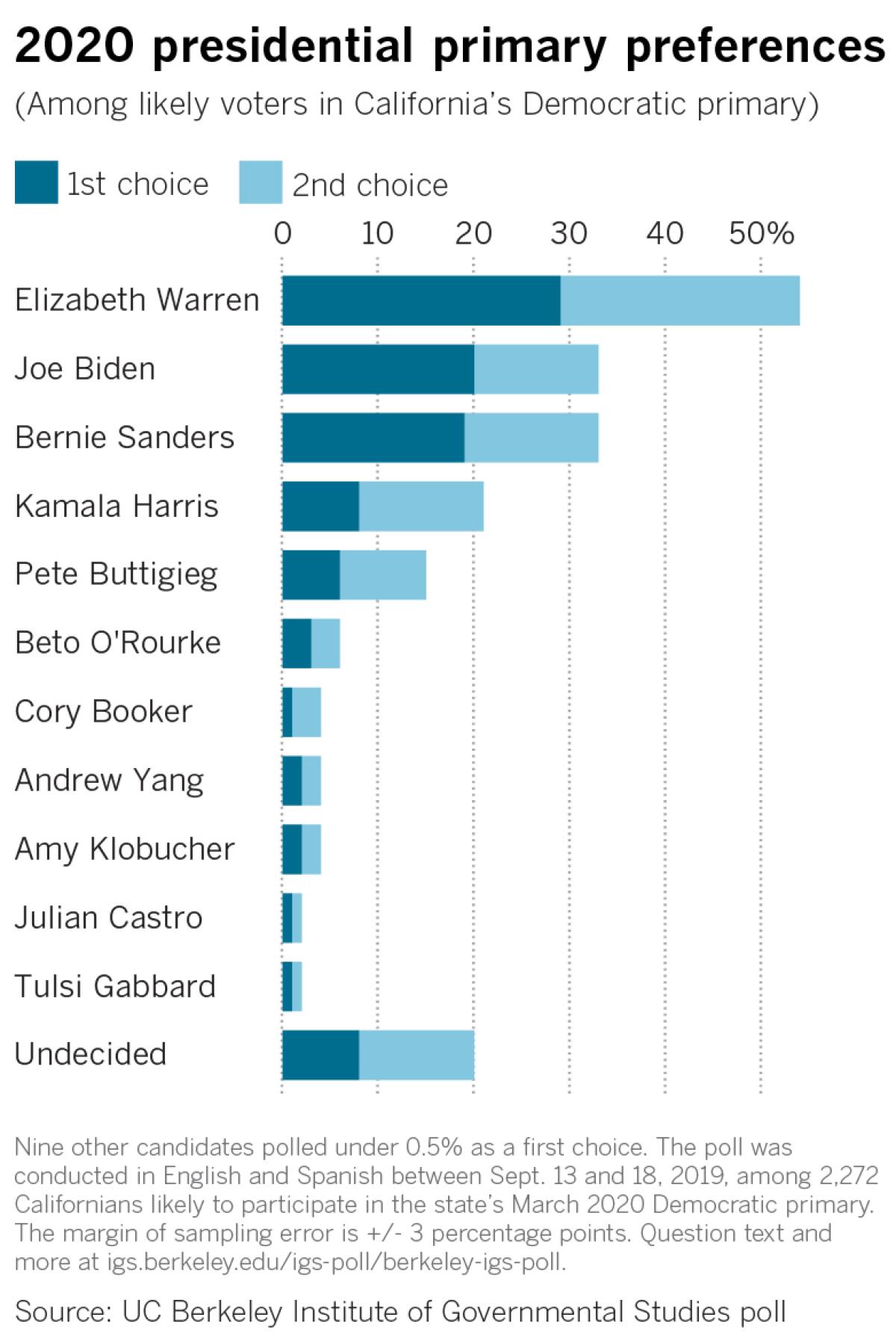
Another California candidate did far worse: Tom Steyer, the billionaire political activist and philanthropist, received roughly 0.1% support. He was one of eight candidates with less than 1% support of the 20 tested by the poll. Steyer has spent heavily to try to build support in some states that hold early primaries and has hit 2% in enough polls of Iowa and New Hampshire to qualify for the next candidate debate.
The poll indicates that Warren “has emerged as the clear alternative to Biden,” said Berkeley political science professor Eric Schickler. Until recently, “the question was whether she and Sanders would divide the vote on the left of the party,” and give Biden a clear path to win. “The answer from this poll is no.”
The poll shows a few weak spots for Warren, but more signs of strength, including several indications that her support could grow over time.
She is the candidate most often named as the second choice among voters who back each of her top rivals, and nearly 7 in 10 primary voters say they are considering her — significantly more than any of the others.
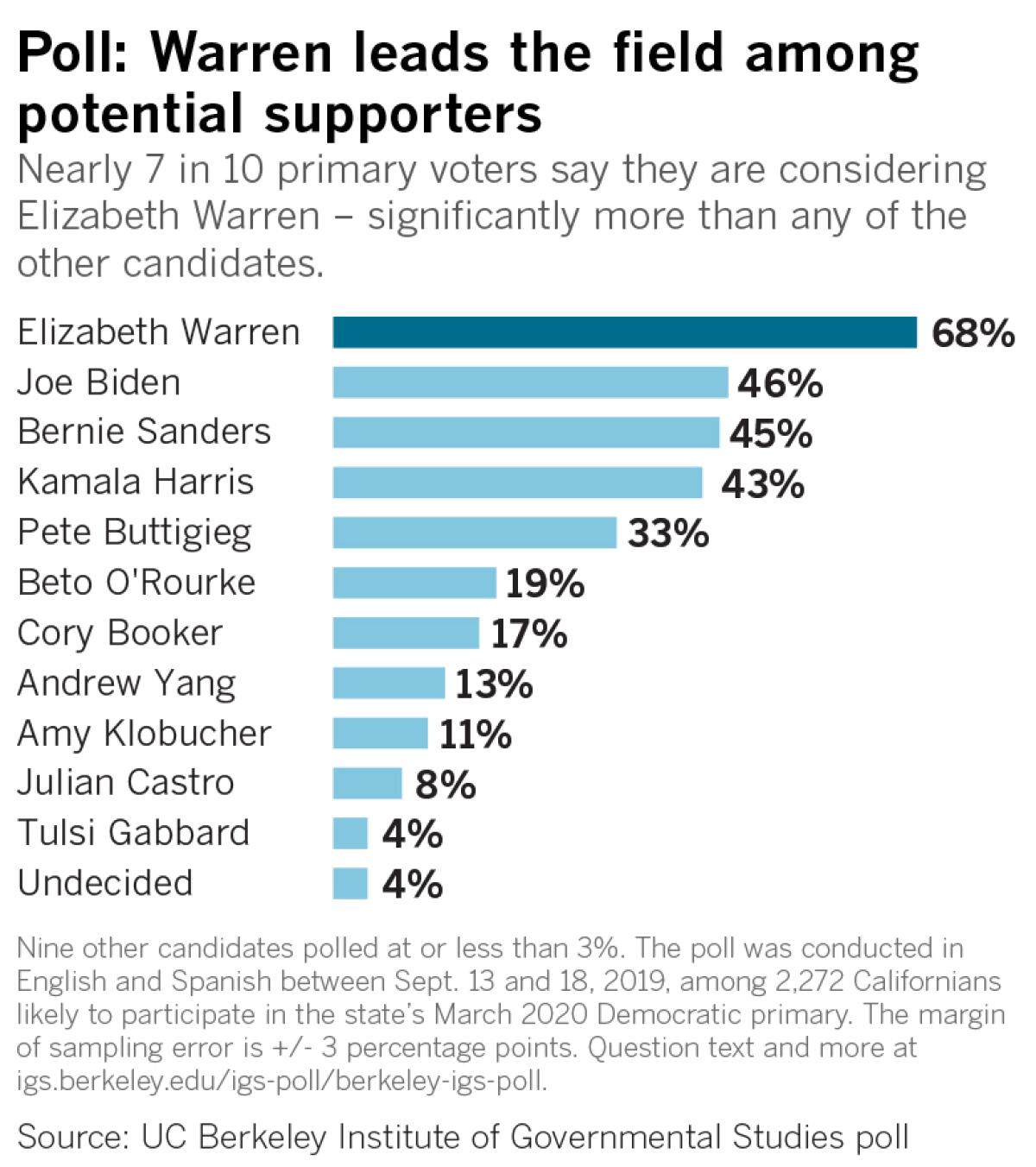
Nearly half the voters say they are considering Biden and Sanders; 43% say they’re considering Harris and 33% say they’re considering Buttigieg.
Warren also has by far the most positive image of all the candidates, with 77% of Democratic voters viewing her positively and only 10% negatively. Democratic voters’ impression of her has grown more favorable as the campaign has gone on. By contrast, both Biden and Harris have seen their images worsen since June.
Finally, although Warren has taken positions on the party’s left on many major issues, her support shows signs of straddling some of the major divisions among Democrats.
On the issue of healthcare, for example, just over 6 in 10 California Democratic voters say the country should move to a Medicare option system that would allow people to either buy into a public plan or keep their private insurance. Close to 4 in 10 back a Medicare for all plan that would eliminate private and employer-provided insurance, the poll finds.
Biden backs the Medicare option plan, and receives nearly 90% of his support in California from voters who agree with him. Sanders backs Medicare for all, and receives more than 70% of his backing from voters who agree with him.
Warren sides with Sanders in that debate, but she draws support from both camps: 45% of her voters back Medicare for all, and 55% say they favor the Medicare option.
The poll tested several other issues:
About three-quarters of Democratic voters in the state say they strongly agree with policies aimed at reducing the use of fossil fuels to achieve “net zero” greenhouse gas emissions over the next 25 years.
Two other ideas that have gained currency in the campaign have majority support among Democrats but generate more opposition than reducing fossil fuel use. Roughly half of the polled voters strongly favor changing penalties for unauthorized border crossings from a criminal violation to a civil one, but about 1 in 5 disagree. Three in 10 also favor including undocumented immigrants in the nation’s healthcare system, but slightly more than 1 in 3 disagree.
Biden’s supporters are considerably more likely to oppose those ideas than are Democratic voters who back Warren, Sanders or Harris, the poll found.
Democrats were almost evenly split on a fourth proposal — withdrawing all U.S. troops from Afghanistan even if that means the Taliban militias regain control over the country. Both Warren and Biden said in the most recent Democratic debate that they would pull U.S. troops out of Afghanistan. President Trump has also set that as a goal, although many of his advisors have opposed him on the policy.
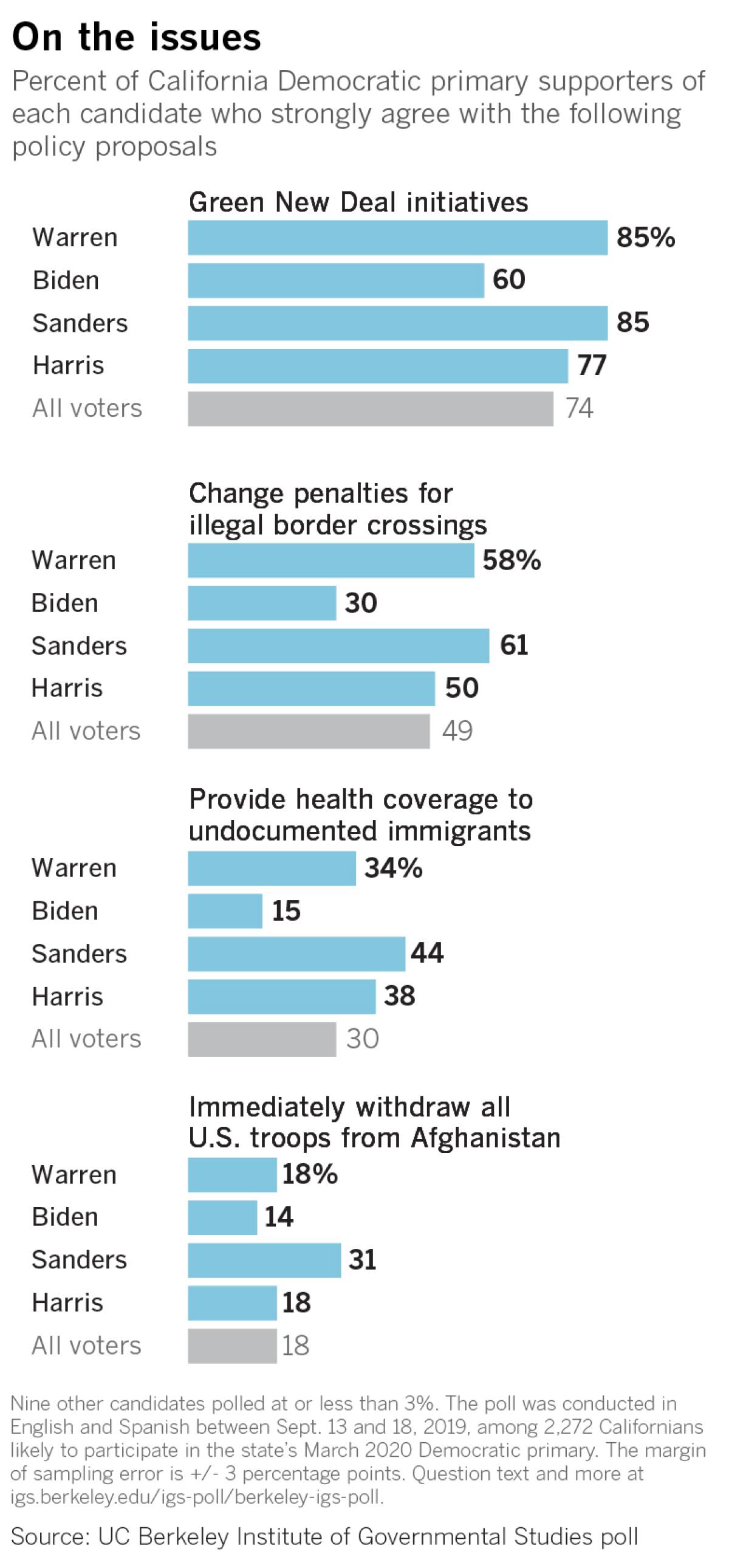
Each of the candidates in the race draws from a different base of supporters. Warren still does best with college-educated white voters, who make up just under a third of the Democratic electorate in the state. She gets support of 39% of them, far out-pacing Biden and Sanders, at 14% and 12% respectively.
But the poll showed Warren gaining ground among non-college-educated whites, a slightly smaller group than college graduates in the California Democratic electorate, but a larger one in many other parts of the country. Among that group, she now gets support from 29%, compared with 20% for Sanders and 18% for Biden. That’s a notable increase from 17% support in the June poll.
Biden still leads among black voters, who form a core part of his support nationwide. He has the support of 32% of African Americans, with 24% for Warren. Harris, who is black, comes in third, with 18%.
African American voters in Detroit are fired up to beat Trump. But they want some love from the 2020 Democratic presidential candidates.
Warren has a large lead among Asian American voters, at 33%, with 19% for Sanders and 14% for Biden.
Among the main ethnic and racial groups in the state, Warren does least well among Latinos. She trails both Biden and Sanders with Latino voters.
That deficit stems from a very low level of support from Latinos whose primary language is Spanish, only about 4% of whom said they support her. That group, however, has significantly more undecided voters than most others, and about half said they don’t know enough about Warren to have an opinion of her, indicating that her deficit may have more to do with unfamiliarity than any firm opposition.
Among English-speaking Latinos, Warren more closely holds her own, essentially tied for second place with Biden, behind Sanders.
Warren’s biggest weak point remains a relative lack of support beyond the party’s liberal base. That’s less of a problem in California, where Democratic voters tilt left, but could handicap her in other parts of the country if the nomination contest becomes a prolonged fight.
One-third of the likely Democratic voters in California describe themselves as “very liberal” and 37% call themselves “somewhat liberal,” the poll found. Warren leads both groups. She gets support of 40% of the most liberal group, compared with 31% for Sanders, who is in second place. Among the somewhat liberal, she has 32%, ahead of Biden, who has 21%.
Biden leads among the 3 in 10 Democrats who call themselves moderate or conservative. Second place in that group goes to “undecided,” and the votes of almost 1 in 5 moderate or conservative voters are scattered among candidates beyond the top five, indicating that moderate voters who don’t support Biden have not coalesced around an alternative.
Support for Warren is strongest in the Bay Area, which accounts for about a quarter of the likely vote in the primary. She leads there with 35%. Biden, Sanders and Harris are closely bunched in second place, with 16%, 14% and 13% respectively, all close to the 15% threshold for receiving delegates from individual districts.
The Massachusetts senator also leads in the state’s other big Democratic stronghold, Los Angeles County, but by a smaller margin, 27%, compared with 21% for Biden, 20% for Sanders and only 7% for Harris, who lives in Los Angeles.
The UC Berkeley Institute of Governmental Studies poll that The Times is publishing uses a method that differs from traditional phone-based surveys.
The poll surveyed 4,527 registered voters statewide, including 2,272 deemed likely to cast ballots in the Democratic primary. It was administered online in English and Spanish from Sept. 13 to 18. The results for the full Democratic sample have an estimated sampling error of roughly 3 percentage points in either direction.
More to Read
Get the L.A. Times Politics newsletter
Deeply reported insights into legislation, politics and policy from Sacramento, Washington and beyond. In your inbox twice per week.
You may occasionally receive promotional content from the Los Angeles Times.
